【初中英语】2018人教新目标版八上Unit 1 Where did you go on vacation(第1课时)习题课件
2018年秋人教新目标版八年级上册英语 Unit 1 备课综合(教案+课时作业+课件+单元测试 (15)
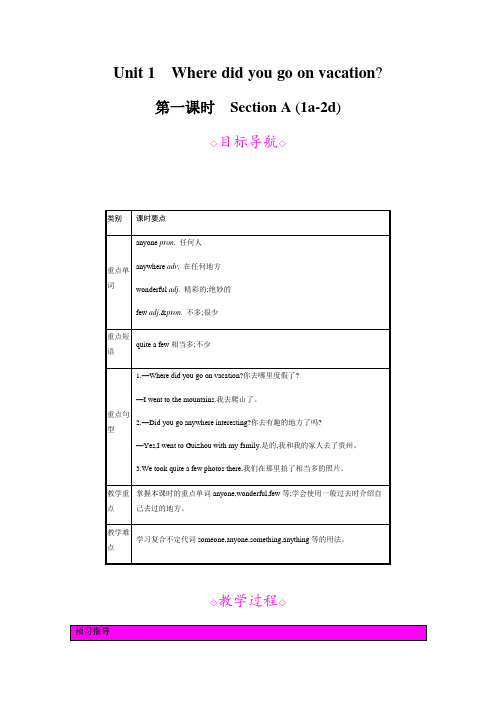
Unit1Where did you go on vacation?第一课时Section A (1a-2d)◇目标导航◇◇教学过程◇一、方法指导预习教材Page 1~2,标注不认识的单词。
然后翻到生词表,通过读和写基本了解本课时的单词。
二、预习检测Ⅰ.汉译英1.任何人anyone2.在任何地方anywhere3.精彩的;绝妙的wonderful4.不多;很少few5.相当多quite a fewⅡ.根据句意及汉语提示完成句子1.Did you go shopping with anyone(任何人)?2.You can buy clothes like these anywhere(在任何地方).3.We had a(n) wonderful(精彩的) time in China.4.I have to buy a(n) few(不多) things at the shop.5.Helen took quite a few(相当多) photos of Huangguoshu Waterfalls.Step1情景导入Teacher:Hello,everyone.Your vacation was over.How was your vacation?What did you do?Where did you go on vacation?Did you go anywhere interesting?Who did you go with?Then do you know how to answer the questions with the Simple Past Tense?We will learn about it.Step2完成教材1a-1c的任务1.认真观察1a中的图片,将所给短语与图片的活动进行搭配,并大声朗读短语。
2.认真听录音,按你听到的顺序给图中的人物编号,核对答案并朗读对话。
人教新目标版英语八上Unit 1《Where did you go on vacation》(Sec
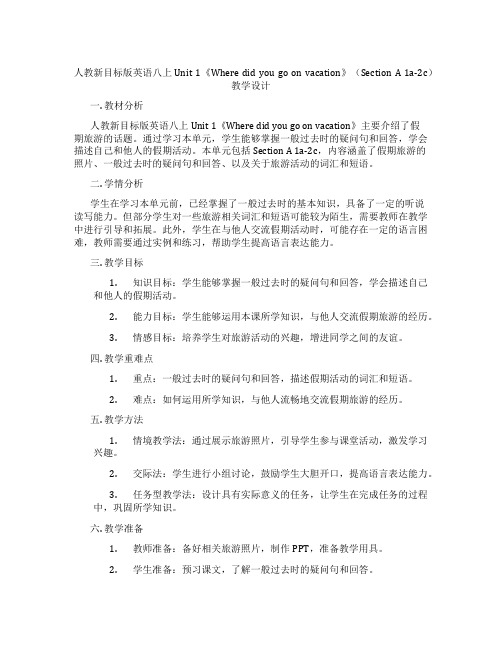
人教新目标版英语八上Unit 1《Where did you go on vacation》(Section A 1a-2c)教学设计一. 教材分析人教新目标版英语八上Unit 1《Where did you go on vacation》主要介绍了假期旅游的话题。
通过学习本单元,学生能够掌握一般过去时的疑问句和回答,学会描述自己和他人的假期活动。
本单元包括Section A 1a-2c,内容涵盖了假期旅游的照片、一般过去时的疑问句和回答、以及关于旅游活动的词汇和短语。
二. 学情分析学生在学习本单元前,已经掌握了一般过去时的基本知识,具备了一定的听说读写能力。
但部分学生对一些旅游相关词汇和短语可能较为陌生,需要教师在教学中进行引导和拓展。
此外,学生在与他人交流假期活动时,可能存在一定的语言困难,教师需要通过实例和练习,帮助学生提高语言表达能力。
三. 教学目标1.知识目标:学生能够掌握一般过去时的疑问句和回答,学会描述自己和他人的假期活动。
2.能力目标:学生能够运用本课所学知识,与他人交流假期旅游的经历。
3.情感目标:培养学生对旅游活动的兴趣,增进同学之间的友谊。
四. 教学重难点1.重点:一般过去时的疑问句和回答,描述假期活动的词汇和短语。
2.难点:如何运用所学知识,与他人流畅地交流假期旅游的经历。
五. 教学方法1.情境教学法:通过展示旅游照片,引导学生参与课堂活动,激发学习兴趣。
2.交际法:学生进行小组讨论,鼓励学生大胆开口,提高语言表达能力。
3.任务型教学法:设计具有实际意义的任务,让学生在完成任务的过程中,巩固所学知识。
六. 教学准备1.教师准备:备好相关旅游照片,制作PPT,准备教学用具。
2.学生准备:预习课文,了解一般过去时的疑问句和回答。
七. 教学过程1.导入(5分钟)教师展示旅游照片,引导学生谈论假期旅游的经历,激发学生对本课内容的兴趣。
2.呈现(10分钟)教师通过PPT展示课文1a-1c的内容,引导学生跟读,注意语音语调。
2018年人教版新目标八年级英语上册全册词汇表整理
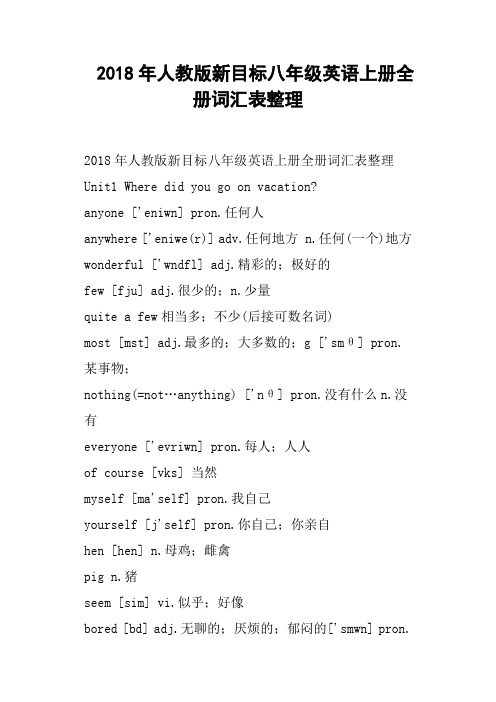
2018年人教版新目标八年级英语上册全册词汇表整理2018年人教版新目标八年级英语上册全册词汇表整理Unit1 Where did you go on vacation?anyone ['eniwn] pron.任何人anywhere ['eniwe(r)] adv.任何地方 n.任何(一个)地方wonderful ['wndfl] adj.精彩的;极好的few [fju] adj.很少的;n.少量quite a few相当多;不少(后接可数名词)most [mst] adj.最多的;大多数的;g ['smθ] pron.某事物;nothing(=not…anything) ['nθ] pron.没有什么n.没有everyone ['evriwn] pron.每人;人人of course [vks] 当然myself [ma'self] pron.我自己yourself [j'self] pron.你自己;你亲自hen [hen] n.母鸡;雌禽pig n.猪seem [sim] vi.似乎;好像bored [bd] adj.无聊的;厌烦的;郁闷的['smwn] pron.某人;有人diary ['dari] n.日记;日记簿(keep a diary)activity [æk'tvti] n.活动;活跃decide [d'sad] v.决定;选定(decide to do sth.)try [tra] v.尝试;设法;努力 (try to do sth. /try doing sth.)paragliding ['pærlad] n.空中滑翔跳伞feel like(doing sth.)想要bird [bd] n.鸟;禽bicycle ['baskl] n.自行车building ['bld] n.建筑物trader ['tred(r)] n.商人;商船wonder ['wnd(r)] v.惊奇;想知道;怀疑d['dfrns] n.差异;不同top [tp] n.顶部;顶wait [wet] v.等;等待(wait for)umbrella [m'brel] n.伞;雨伞wet [wet] adj.湿的;雨天的because of因为;由于below [b'l] prep.低于;在...下面adv.在下面enough ['nf] adj.足够的adv.足够地;充分地hungry(反full) ['hri] adj.饥饿的;渴望的as [z] conj.如同;像...一样hill美[hl] n. 小山;丘陵;斜坡;山冈duck [dk] n.鸭肉;鸭dislike [ds'lak] v.不喜欢;厌恶 n.不喜爱;厌恶;反感have a goodlf=have fun(doing sth.)玩得痛快Central Park 中央公园Huangguoshu waterfall 黄果树瀑布Hangkong H.K. 香港Malaysia 马来西亚Georgetown 圭亚那乔治敦港口,美国乔治城大学Weld Quay街 (海乾街/码头) 位于马来西亚槟城岛(州),乔治市Penang Hill 马来西亚槟榔山(升旗山)tian'anmen square 天安门广场the Palace Museum 故宫博物院Unit2 How often do you exercise?housework ['haswk] n.家务劳动hardly ['hdli] adv.几乎不;简直不;刚刚ever ['ev(r)] adv.曾经;在任何时候hardly ever很少;几乎从不;难得once [wns] adv.一次;曾经twice [twas] adv.两倍;两次I['ntnet] n.因特网program ['prræm] n.节目;程序;课程;节目单full [fl] adj.满的;充满的;完全的swing [sw] n.摇摆;秋千v.摇摆;旋转swing dance摇摆舞maybe ['mebi] adv.或许;也许;可能least [list] adj.最小的;最少的at least至少junk n.垃圾;废旧杂物junk food n.垃圾食品;无营养食品['kfi] n.咖啡;咖啡色health [helθ] n.健康;人的身体或精神状态result [r'zlt] .结果;后果[p'sent] adj.百分之...的online [n'lan] adj.在线的adv.在线地television ['telvn] n.电视机;电视节目although [l'ð] conj.虽然;尽管;然而;可是through [θru] prep.穿过;凭借;一直到mind [mand] .头脑;想法;意见;心思body ['bdi] n.身体such [st] adj.这样的;如此的such as例如;诸如together [t'eð(r)] adv.共同;一起die [da] v.死;枯竭;消失writer ['rat(r)] n.作者;作家dentist ['dentst] n.牙科医生magazine ['mæzin] n.杂志however [ha'ev(r)] adv.然而;无论如何;不管多么than [ðn] conj.比an超过;多于;不仅仅;非常almost ['lmst] adv.几乎;差不多none [nn] pron.没有人;没有任何东西,毫无less [les] adj.更少的;较少的less than不到;少于point [pnt] n.看法;要点;重点;小数点;目标;分数Unit3 I'utgoing thautgoing ['at] adj.外向的better ['bet(r)] adj.更好的;较好的 adv.更好地loudly ['ladli] adv.大声地;高声地;花俏地quietly ['kwatli] adv.安静地;悄悄地;平静地hard-working [hd'wk] adj.勤勉的;努力工作的[kmp'tn] n.竞争;比赛fantastic [fæn'tæstk] adj.极好的;了不起的which adj.哪一个;哪一些pron.哪一个;哪些clearly ['klli] adv.清楚地;显然地win [wn] v.赢;赢得;获胜;获得n.胜利though conj.虽然;尽管;adv.不过talented ['tælntd] adj.有才能的;有天赋的truly ['truli] adv.真实地;真诚地;正确地care [ke(r)] v.关心;担忧;照顾;在乎care about关心serious ['sris] adj.严肃的;严重的;庄重的['mr(r)] n.镜子;反映kid n. 孩子,小孩as long as只要necessary ['nessri] adj.必要的;必然的be d和...不同both [bθ] adj.两者都pron.两者bring out拿出;推出grade n. 成绩should [d] aux.应该;可能;应当;将要the same as与...同样的saying n. 名言reach [rit] v.到达;伸出;达成;取得联系;延伸;(伸手)去够hand n.援手touch [tt] vt.触摸;感动heart [ht] n.心脏;内心fact [fækt] n.事实;真相;实际in fact事实上;实际上;确切地说break [brek] v.打碎;折断;违背;解决;中断arm n. 胳膊laugh [lf] v.发笑;笑;嘲笑 n.笑声;笑;笑料share [e(r)] vt.分享,共享;分配;共有loud [lad] adj.大声的;adv.大声地;响亮地similar ['sml(r)] adj.类似的be similar to类似于;与...相似primary ['pramri] adj.最初的,最早的primal 小学information [nf'men] n.信息;情报;资料;通知Unit4 What's the best movie theater?theater ['θt] n.剧场;电影院;戏院able ['kmftbl] adj.舒适的;充裕的seat [sit] n.座位;[skrin] n.屏幕;银幕close [kls] v.关;合拢;不开放;停业票worst [wst] adj.最坏的;最差的cheaply ['tipli] adv.廉价地;粗俗地song [s] n.歌曲;歌唱[tuz] v.选择;决定carefully ['kefli] adv.小心地,认真地[r'pt(r)] n.记者so far到目前为止;迄今为止fresh [fre] adj.新鲜的;清新的ably ['kmftbli] adv.舒服地;容易地;充裕地worse [ws] adj.更坏的;更差的service ['svs] n.服务['prti] adv.相当地adj.漂亮的menu ['menju] n.菜单act [ækt] v.行动;表演meal [mil] n.一餐;膳食creative [kri'etv] adj.创造的,创造性的;[p'fm(r)] n.表演者;执行者talent ['tælnt] n.天赋;才能,才艺;['kmn] adj.常见的;共同的;普通的have…有相同特征magician [m'dn] n.魔术师;术士all kinds of各种各样;各种类型beautifully ['bjutfli] adv.美丽地;完美地;be up to是…….的职责;由…….决定role [rl] n.作用;角色play a role发挥作用;有影响winner ['wn(r)] n.获胜者prize [praz] n.奖品;奖金everybody ['evribdi] pron.每人;人人make up编造example ['zmpl] n.例子;榜样for example例如poor [p(r)] adj.可怜的;贫穷的seriously ['srisli] 严重地,严肃地take…seriously认真对待give [v] v.给;赠予;送crowded ['kradd] adj.拥挤的Unit5 Do you want to watch a game show?['stkm] n. (situady) 情景喜剧news [njuz] n.新闻;消息soap [sp] n. 肥皂;soap opera 肥皂剧educational [edu'kenl] adj.教育的;有教育意义的plan [plæn] n.计划;方法v.打算;计划hope [hp] .希望;期望;盼望n.希望find out查明、弄清discussion [d'skn] n.讨论;谈论stand [stænd] v.站立;忍受happen ['hæpn] vi.发生;碰巧;出现;偶遇may [me] aux.可以,能够;可能,也许expect [k'spekt] v.预期;期待;盼望joke [dk] n.笑话;玩笑v.说笑话;开玩笑comedy ['kmdi] n.喜剧;滑稽;幽默事件meaningless ['minls] adj.无意义的;不重要的action ['ækn] n.行为;活动avie动作片cartoon [k'tun] n.卡通;漫画culture ['klt(r)] n.栽培;文化;教养famous ['fems] adj.著名的;有名的appear ['p(r)] vi.出现;出版;显得become [b'km] v.变成;成为rich [rt] adj.富有的;富饶的;丰富的successful [sk'sesfl] adj.成功的;圆满的might [mat] aux.可能;也许;may的过去式main [men] adj.主要的;最重要的reason ['rizn] n.原因;理由comedy ['kmdi] n.喜剧film [flm] n.电影unlucky [n'lki] adj.倒霉的;不幸的;不吉利的lose [luz] vt.丢失;失败vi.失败girlfriend ['lfrnd] n.女朋友ready ['redi] adj.准备好的;乐意的be ready to愿意迅速做某事character ['kærkt(r)] n.个性;品质;人物;simple ['smpl] adj.简单的;朴素的;单纯的;笨的dress up装扮;乔装打扮take sb.’s place代替;替换army ['mi] n.军队;陆军;一大批do a good job工作干得好;做得好Unit6 I'm going to study compugrow up 长大成长computer programmer 计算机管理员cook [kk] vt. 烹调,煮,烧,做(饭):vi. 烹饪,做饭,烧菜;加热处理食物doctor ['dkt(r)]医生engineer [end'nr] 工程师violinist [va'lnst]小提琴手driver ['drav] n. 驾驶员;驱动程序;起子;传动器pilot ['palt] 飞行员pianist ['pnst] 钢琴家['santst]科学家be sure about 确信make sure 确保college ['kld] 大学education [edu'ken] 教育medicine ['medsn]药,医学university [jun'vrsti] 大学,高等学府London 'lndn] n.伦敦article ['rtkl]文章,论文send [send] 邮寄,发送resolution [rez'lun] 决心,决定team [tim] (一)队(人);(一)组(人)foreign ['frn] 外国的able [ebl] 能够be able to 能够做某事question ['kwstn] n.问题meaning ['min] n. 意义;; adj. 意味深长的v. 意味;意思是discuss [dsks] 讨论,商量[prms] 承诺,诺言beginning [bn] 开头,开端at the beginning of 起初improve [mpruv] 改进,改善write down 写下physical ['fzkl]身体的themselves [ðm'slvz] 他们自己have to do with关于;与……有关系selfimprovement [selfmp'ruvmnt]自我改进,自我提高take up学着做;开始做hobby ['hbi] 业余爱好weekly ['wikli] adj. 每周的;; n. 周刊adv. 每周一次;逐周[ 复数 weeklies ]school work 学校作业agree ['ri] vt. 同意;赞成;承认vi. 同意;意见一致agree with 同意own [on] 自己的,本人的,拥有al ['prsnl]个人的,私人的rela[r'lenp] 关系Unit 7 Will people have robots?paper['pepr] 纸pollution [p'lun] 污染;污染物prediction[pr'dkn]预测future ['fjutr] 未来pollute[p'lut] 污染env[n'varnmnt] 环境planet ['plænt] 行星earth[rθ] n.地球;泥土plant [plænt] 种植,植物part [prt] 参加,部分play a park 参与(某事)peace [pis]和平sea [si] n. 海;海洋;许多;大量sky[ska] 天空astronaut['æstrnt] 宇航员apartment['prtmnt] 公寓房间['rkt] 火箭;space[spes] .空间;太空space station 太空站human ['hjumn] 人的; n.人;人类servant['srvnt] 仆人dangerous ['dendrs] 危险的already[l'redi]已经factory['fæktri] 工厂over and over again 多次;反复地believe [b'liv] 相信disagree [ds'ri]不同意even['ivn] 甚至;愈加hundreds of 许多;大量;成百上千shape [ep] 形状fall [fl] 倒塌;跌倒fall dow n 突然倒下;跌倒;倒塌inside ['n'sad]n. 里面;内部;内情;内脏adj. 里面的;内部的;秘密的adv. 在里面prep. 少于;在…之内l寻找;寻求possible ['psbl] 可能的ble [m'psbl]adj. 不可能的;不可能存在的;难以忍受的;不真实的n. 不可能;不可能的事side [sad]n. 方面;侧面;旁边vi. 支持;赞助;偏袒adj. 旁的,侧的vt. 同意,支持probably ['prbbli] 大概;或许;很可能during ['dr] prep. 在…的时候,在…的期间holiday ['hlde] 假日word [wrd] 单词;Unit 8 How do you make a banana milk shake?shake [ek] vt. 动摇;摇动;震动vi. 动摇;摇动;发抖n. 摇动;哆嗦milk shake奶昔(牛奶和冰淇淋等的混合饮料)blender['blendr] 搅拌器;果汁机turn on 接通(水、煤气、电等开关)打开peel [pil] vt.剥落;削皮pour [pr] pour[pr] 倒;倾倒yogurt ['jort] 酸奶;honey ['hni]蜂蜜watermelon ['wtrmeln]西瓜[spun] 勺,调羹pot [pt] n. 壶;盆;罐vt. 把…装罐;射击;节略vi. 随手射击add [æd] 增加finally ['fanli] 最后,最终salt[slt] 盐sugar['r] 糖[tiz] 干酪,奶酪['ppkrn] 爆米花corn [krn] 玉米,谷物machine[m'in] 机器dig [d] vt. 挖,掘;探究vi. 挖掘n. 戳,刺;挖苦hole [hol] n. 洞,孔;洞穴,穴;突破口vi.穿孔;(高尔夫球等)进洞vt. 凿洞sandwich['sænwt] 三明治butter['btr] 黄油,奶油turkey ['trki]火鸡lettuce ['lets] 莴苣,生菜piece[pis] 件;篇;片;块;Thanksgiving [,θæks'v] n. 感恩节traditional [tr'dnl] 传统的autumn ['tm] n. 秋天;成熟期;渐衰期,凋落期adj. 秋天的,秋季的traveler ['trævl] 旅行者England['lnd] 英格兰;英国celebrate ['selbret] 庆祝;庆贺mix [mks] vt. 配制;混淆;使混和;使结交vi. 参与;相混合;交往n. 混合;混合物;混乱['pepr] 胡椒粉;辣椒fill [fl] vt. 装满,使充满;满足;堵塞;任职vi. 被充满,膨胀n. 满足;填满的量;装填物oven['vn] 烤箱;烤炉plate [plet] n. 碟;金属板;金属牌;感光底片vt. 电镀;给…装甲cover['kvr] 遮盖,盖子,gravy['revi] 肉汁;肉汤serve[srv] 接待,服务ature ['temprtr] 温度,气候Unit 9 Can youarty?prepare [pr'per]v.预备;准备prepare for 为……准备exam['zæm] 考试flu [flu] n. 流感available['velbl] 可得到的;有空的;a其他时间,别的时间until [n'tl]conj. 在…以前;直到…时prep. 在…以前;到…为止hang [hæ] 悬挂;(使)低垂hang out 常去某处;泡在某处catch[kæt] 赶上;抓住;捕捉invite [n'vat] 邀请accept[k'sept] 接受;refuse [r'fjuz] 拒绝the day bday 前天the day aw 后天weekday ['wikde] n. 平日,工作日look after 照顾,照料invitation [nv'ten] 邀请;邀请函turn down减小,关小,调低reply [r'pla] 回答,回复forward['frwrd] 转交;发送,向前的delete [d'lit] 删除print [prnt] n. 印刷业;印花布;;印章;印记vt. 印刷;打印;刊载; vi. 印刷;sad [sæd] adj. 难过的;悲哀的,令人悲痛的;凄惨的,阴郁的(形容颜色)goodbye [gd'ba] int. 再见take a trip 去旅行glad [læd] adj. 高兴的;乐意的;令人高兴的;灿烂美丽的vt. 使高兴preparation [prep'ren]准备,准备工作glue [lu]vt. 粘合;似胶般固着于n. 胶;各种胶合物without [w'θat] prep. 没有;超过;在…外面adv. 户外;在外面;没有或不显示某事物n. 外部;外面surprised [s'prazd] adj. 感到惊讶的,出人意料的v. 使惊奇(surprise的过去分词形式)look forward to 盼望,期待hear from 收到......来信housewarming ['has,wrm] n. 乔迁庆宴opening['opn]开幕式,落成典礼['knsrt] 音乐会headmaster[hed'mæstr] 校长event['vent]大事,公开活动guest[est] 客人calendar['kælndr] 日历,日程表daytime ['detam] n. 日间,白天Unit10 If you garty,you 'll have a great time! meeting ['mit] n. 会议;会见;集会;汇合点v. 会面;会合(meet的ing形式)video ['vdio] 录像,录像带pota马铃薯片;油炸薯片chocolate ['tklt]巧克力upset[p'set]难过,失望taxi ['tæksi] vi. 乘出租车;滑行vt. 使滑行;用出租车送n. 出租汽车advice[d'vas]劝告,建议travel['trævl] 旅行agent['ednt] 代理人,经纪人expert ['eksprt]专家,能手keep…lf 保守秘密teenager ['tined] 青少年normal['nrml]正常的unless[n'les] 除非,如果不certainly ['srtnli] 当然,肯定wallet['wlt] 皮夹,钱包mile [mal] n. 英里;一英里赛跑;较大的距离angry ['æri] 生气的,发怒的understanding [ndr'stænd]善解人意的,体谅人的careless ['kerls] 粗心的,不小心的mistake[m'stek] 错误,失误himself [hm'slf] pron. 他自己;他亲自,他本人careful['kerfl] 小心的,细致的advise [d'vaz] v劝告,建议solve [slv] 解决;解答step [stp] n. 步,脚步;步骤;步伐;梯级vi. 踏,踩;走vt. 走,迈步trust[trst] 相信,信任ex[k'sprins] 信任,经历in half 分成两半,一半halfway [hæf'we] 中途的adv.半路地else[els] 别的,其他的。
2018年秋八年级英语上册Unit1Wheredidyougoonvacation教案新版人教新目标版【word版】.doc

Unit 1Where did you go on vacation?单元教材分析课时教学设计第一课时Section A (1a-2d)1.通过看图说话、师生问答、听录音、角色扮演、猜谜语、简笔画等形式,教会本课时的单词anyone,anywhere,wonderful,few,most和短语quite a few。
2.通过师生问答、角色扮演等形式,教会“Where did you go on vacation?”“I went to…”和“Did you…?”等句型。
重点让学生学会描述自己假期所进行的活动。
难点学会用一般过去时态描述过去发生的事情;掌握不定代词的用法。
Step 1情景导入通过师生自由交际进行复习与热身。
让学生回忆曾经学过的与假期活动相关的词汇。
例如:stay at home, go to the mountains, go to New York City, go to the beach, go to summer camp…。
通过师生谈论自己假期所做的事情,调动学生对本课时话题的学习兴趣,从而达到巩固已学知识的目的,同时实现新旧知识的衔接。
For example:T:Do you like playing basketball?S:Yes!T:So do I. Do you want to play basketball?S:OK. After class we'll play it on the playground.T:Do you usually stay at home on vacation?S:No,I don't. I usually go to the mountains.…(设计意图:本环节旨在通过“头脑风暴”进行课前热身,让学生打开记忆的大门,快速激活已有的知识库存,为下一环节的学习奠定基础。
同时,快速复习也可以激发学生的学习欲望,让学生敢于开口表达,增强学习的信心。
人教新目标版英语八上Unit 1《Where did you go on vacation》精美教学
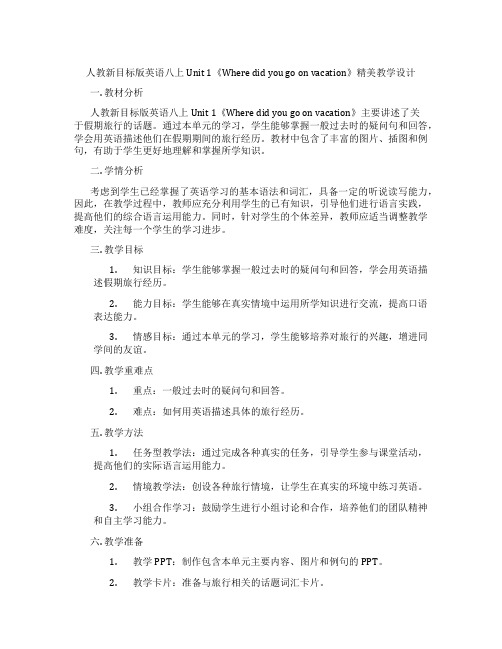
人教新目标版英语八上Unit 1《Where did you go on vacation》精美教学设计一. 教材分析人教新目标版英语八上Unit 1《Where did you go on vacation》主要讲述了关于假期旅行的话题。
通过本单元的学习,学生能够掌握一般过去时的疑问句和回答,学会用英语描述他们在假期期间的旅行经历。
教材中包含了丰富的图片、插图和例句,有助于学生更好地理解和掌握所学知识。
二. 学情分析考虑到学生已经掌握了英语学习的基本语法和词汇,具备一定的听说读写能力,因此,在教学过程中,教师应充分利用学生的已有知识,引导他们进行语言实践,提高他们的综合语言运用能力。
同时,针对学生的个体差异,教师应适当调整教学难度,关注每一个学生的学习进步。
三. 教学目标1.知识目标:学生能够掌握一般过去时的疑问句和回答,学会用英语描述假期旅行经历。
2.能力目标:学生能够在真实情境中运用所学知识进行交流,提高口语表达能力。
3.情感目标:通过本单元的学习,学生能够培养对旅行的兴趣,增进同学间的友谊。
四. 教学重难点1.重点:一般过去时的疑问句和回答。
2.难点:如何用英语描述具体的旅行经历。
五. 教学方法1.任务型教学法:通过完成各种真实的任务,引导学生参与课堂活动,提高他们的实际语言运用能力。
2.情境教学法:创设各种旅行情境,让学生在真实的环境中练习英语。
3.小组合作学习:鼓励学生进行小组讨论和合作,培养他们的团队精神和自主学习能力。
六. 教学准备1.教学PPT:制作包含本单元主要内容、图片和例句的PPT。
2.教学卡片:准备与旅行相关的话题词汇卡片。
3.教学视频:寻找一段有关旅行的英文视频,用于课堂展示。
七. 教学过程1.导入(5分钟)利用英文歌曲《Where did you go on vacation》激发学生的兴趣,然后引导学生谈论他们自己的假期经历,自然引入本课主题。
2.呈现(10分钟)通过PPT展示本课的主要内容,包括一般过去时的疑问句和回答,以及与旅行相关的词汇和短语。
最新人教新目标版中学八年级英语上册 Unit 1 Where did you go on vacation教案1
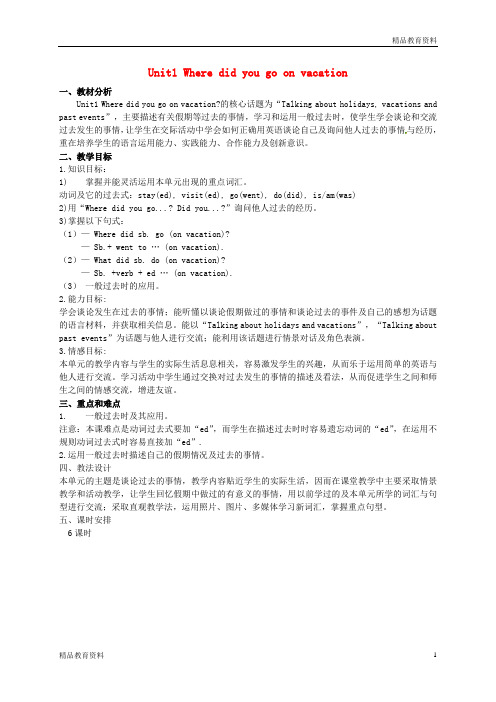
Unit1 Where did you go on vacation一、教材分析Unit1 Where did you go on vacation?的核心话题为“Talking about holidays, vacations and past events”,主要描述有关假期等过去的事情,学习和运用一般过去时,使学生学会谈论和交流过去发生的事情,让学生在交际活动中学会如何正确用英语谈论自己及询问他人过去的事情与经历,重在培养学生的语言运用能力、实践能力、合作能力及创新意识。
二、教学目标1.知识目标:1) 掌握并能灵活运用本单元出现的重点词汇。
动词及它的过去式:stay(ed), visit(ed), go(went), do(did), is/am(was)2)用“Where did you go...? Did you...?”询问他人过去的经历。
3)掌握以下句式:(1)— Where did sb. go (on vacation)?—Sb.+ went to … (on vacation).(2)— What did sb. do (on vacation)?—Sb. +verb + ed … (on vacation).(3)一般过去时的应用。
2.能力目标:学会谈论发生在过去的事情;能听懂以谈论假期做过的事情和谈论过去的事件及自己的感想为话题的语言材料,并获取相关信息。
能以“Talking about holidays and vacations”,“Talking about past events”为话题与他人进行交流;能利用该话题进行情景对话及角色表演。
3.情感目标:本单元的教学内容与学生的实际生活息息相关,容易激发学生的兴趣,从而乐于运用简单的英语与他人进行交流。
学习活动中学生通过交换对过去发生的事情的描述及看法,从而促进学生之间和师生之间的情感交流,增进友谊。
三、重点和难点1. 一般过去时及其应用。
人教新目标八年级英语上册Unit1Wheredidyou(1a-2a)教学案
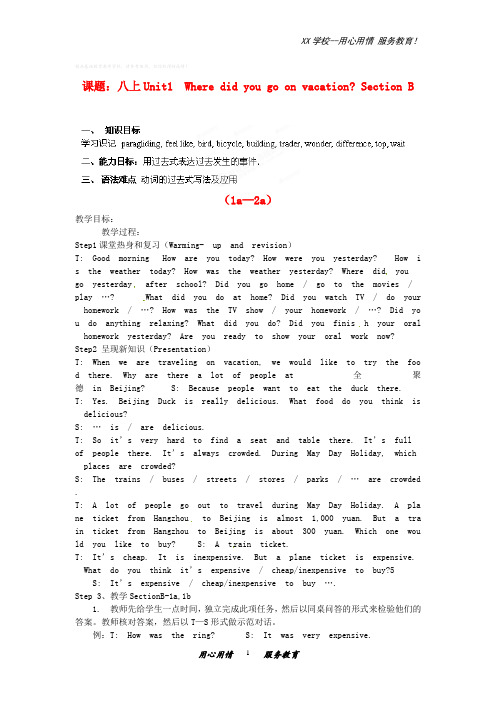
精品基础教育教学资料,请参考使用,祝你取得好成绩!课题:八上Unit1 Where did you go on vacation? Section B(1a—2a)教学目标:教学过程:Step1课堂热身和复习(Warming- up and revision)T: Good morning How are you today? How were you yesterday? How i s the weather today? How was the weather yesterday? Where did you go yesterday after school? Did you go home / go to the movies / play …?What did you do at home? Did you watch TV / do your homework / …?How was the TV show / your homework / …?Did yo u do anything relaxing? What did you do? Did you finis h your oral homework yesterday? Are you ready to show your oral work now?Step2 呈现新知识(Presentation)T: When we are traveling on vacation, we would like to try the foo d there. Why are there a lot of people at 全聚德in Beijing? S: Because people want to eat the duck there. T: Yes. Beijing Duck is really delicious. What food do you think is delicious?S: …is / are delicious.T: So it’s very hard to find a seat and table there. It’s full of people there. It’s always crowded. During May Day Holiday, which places are crowded?S: The trains / buses / streets / stores / parks / …are crowded .T: A lot of people go out to travel during May Day Holiday. A pla ne ticket from Hangzhou to Beijing is almost 1,000 yuan. But a tra in ticket from Hangzhou to Beijing is about 300 yuan. Which one wou ld you like to buy? S: A t rain ticket.T: It’s cheap. It is inexpensive. But a plane ticket is expensive. What do you think it’s expensive / cheap/inexpensive to buy?5 S: It’s expensive / cheap/inexpensive to buy ….Step 3、教学SectionB-1a,1b1. 教师先给学生一点时间,独立完成此项任务,然后以同桌问答的形式来检验他们的答案。
人教版新目标版八年级英语上册 Unit 1 Where did you go on vacation教案(5)

免费下载网址/Unit 1 Where did you go on vacation?Ⅰ.Analysis of teaching materials:This unit is around "Holidays and vacation”to carry out teaching activities.Students should learn to use past tense to talk about holiday activities.The content is close to students’lives,it’s also a topic that students are willingto discuss and share with others .So in teaching process ,we can consolidate thekey sentences “Where did you go on vacation? Did you …How …”through different methods such as pair work ,acting , reporting and interviews. Students can consolidate and study further about the past tense on the basis of original.Studentscan also use the past tense to write a diary about their vacations.Ⅱ.Teaching Aims:1.Knowledge aims:①Ss talk about travel activities correctly using “where” and “how”.②Ss master questions with auxiliary “did”and the answers to the questions.③Ss learn to express their feelings correctly.2.Ability aims::①Ss can ask and answer questions about the things in the past using the past tense.②Ss can use description words to express their feelings.③Ss can record a vacation in a form of a diary and express their feelings aboutthe vacations.3Emotional aims:Ss get to know more about each other through the exchange of what they have seen, heard and felt.Ss learn to express their feelings in a better way.Ⅲ.Teaching important and difficult points1、Ss master and use the vocabulary and expressions.2、Ss master general questions and special questions and the answers to the questions.3、Ss master the past tense of regular and irregular verbs .Ⅳ.Teaching arrangements1.Section A 1a~2c 2. Section A 2d~3c 3. Section B 1a~1e 4.Section B 2a~2e 5. Review of Unit 1. 3a~Self check 2解压密码联系qq 1119139686 加微信公众号jiaoxuewuyou 九折优惠!淘宝网址:Unit 1 Where did you go on vacation?Period 1 Section A 1a~2cI. Teaching Aims:1.Knowledge aims:Key words and phrases: New York City. Central Park anyone. anywhere interesting wonderful.Key sentences: Where did you go on vacation?I went to New York City.Did you buy anything special?Yes. I bought something special for my dad.2.Ability aims: Students learn to discuss their vacations in the past using key sentences.Students improve their listening and speaking skills.3. Emotional aims: Ss exchange their feelings about their vacations and know more about each other.II. Teaching important and difficult pointsSs master key words and sentences, then use them correctly.Ss learn to talk about what they did in the past.Ss improve their listening and speaking skills.Ⅲ. Teaching Aids:mufti-media, tapeⅣ. Teaching ProcedureTeacher’ s activities Ss’ activities PurposesStep 1 Greeting and lead-inGreeting: Long time no see.Did you have a good time during your summer holidays?What did you do during summer holidays?Did you go on vacation?Say : Most of you went on vacation, Now let’s talk about your vacations. Ss say something abouttheir activities duringsummer holidays.1.Ss answer the questionsand then remind of pasttense2. To present a newlesson.Step 2 PresentationAsk four students the following questions:Did you go anywhere interesting? Where did you go on vacation?Did you go with anyone?Did you do anything interesting? What did you do on vacation?How was the vacation? Four students answerthe questions. Otherstudents listencarefully and learn thequestions. Get thefifth student to askanother student thesame questions insteadof the teacher. Then1.Ss learn the keysentences.2.To help them learnbetter, Ss ask thequestions instead of theteacher .It makes themget more chances to speakthey should pass on the questions, choose anyone they want to ask.Step 3A Guessing GameI also went somewhere interesting. Can you guess? Show Ss some pictures of different places.Teach: New York City,Central Park. Ss g uess the placewhere I went. Theyshould guess using“ Didyou go to …/visit …?”1.To help Ss toconsolidate the sentencestructure.2.To enliven theatmosphere of the class.3.Make them interested inmy vacation.Step 4 An interviewGet Ss to make an intervie w about my vacation and answer students’questions.Ask: How was your vacation? ( teach “wonderful”) Ss watch a video.Try to ask the teacheras many questions asthey canTo help Ss to consolidatethe sentence structure.Step 5 Pair workAsk:Do you want to know more about your partner’s vacation?Now let’s ask and answer questions in Pairs. Try to use the questions you have learned.Choose some of them to act out. Ss work in pairs.When some students areacting. The otherstudents should listencaref ully and takenotes. Then anotherpa ir should ask andanswer question using“Where did she\he go onvacation? Did she\he …How was …”1.To help Ss toconsolidate the sentencestructure.2.Make Ss listen toothers carefully whileacting3.To improve theirlistening and speakingskillsStep 6 Work on 1a and 1bSay: We had vacations. So did the students in Section A 1a, Unit 1. Ask:Where did they go on vacation?. Who went to the mountains \stayed at home…? Ss finish 1a.Ss listen to 1b, thennumber the people in thepicture.To help Ss to consolidatethe knowledge they havelearned and improve theirlistening skills.Step 7 Pair workSay :You know where the people went ,now let’s make conversations about their vacation. Ss make conversationsabout the people in thepicture. They shoulduse at least twoquestions like“Did …”“ Where …”To improve theirspeaking skills.Step 8 ListeningSay: We know where Tina, Xiang Hua, Sally, Bob and Tom went on vacation. Ss listen and finish 2a. To train their listeningskills.How about Grace. Kevin, Julie?Ask: Do you want to know more about their vacations?H ere are some questions about the vacations. Ss listen again and finish 2b.Step 9. Role-play conservations Say :Read the conversations in 2a and 2b then role play the conversations. Get Ss to use at least five questions about each vacation.Say :While two students are acting. The others should listen and say at least five sentences about the c onversation they hear l ike this:Grace went to …, she went with …. She …. Ss read theconversations and someof them role playaccording to theinformation in 2a and2b.Others listencarefully and saysomething about theinformation they hear.To train their speakingskills.To develop students’good listening habits.Step 10. Homework1. Memorize the words and sentencesin the period.2. Read the conversations in 1b and2a. Try to memorize key phrases andsentences.3. Make a conversation aboutvacations with partners. Use atleast 6 questions.4. Workbook 1. Period 1.Bb design:Unit 1 Where did you go on vacation?Period 1Long time no see. Did you go anywhere (interesting) on vacation?Yes, I did.Where did you go on vacation?I went to New York City.Did you go with anyone?buy anything special?meet anyone interesting?How was the weather / food / vacation?It was wonderful/ excellent / great…?Teaching reflections。
人教新目标八年级上册英语:Unit 1 Where did you go on vacation?S
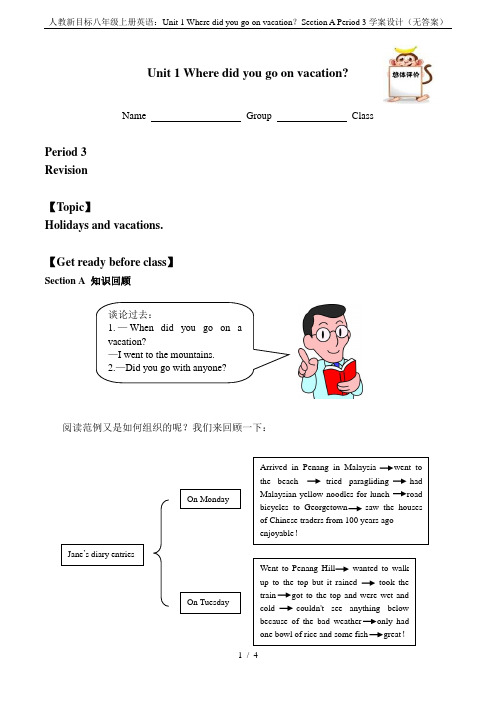
Unit 1 Where did you go on vacation?Name Group ClassPeriod 3Revision【Topic 】Holidays and vacations.【Get ready before class 】Section A 知识回顾阅读范例又是如何组织的呢?我们来回顾一下:谈论过去:1.—When did you go on a vacation?—I went to the mountains. 2.—Did you go with anyone? —Yes ,I went with my mother.Jane ’s diary entriesOn MondayOn TuesdayArrived in Penang in Malaysia went to the beach tried paragliding had Malaysian yellow noodles for lunch road bicycles to Georgetown saw the houses of Chinese traders from 100 years ago enjoyable !Went to Penang Hill wanted to walk up to the top but it rained took the train got to the top and were wet and cold couldn't see anything below because of the bad weather only had one bowl of rice and some fish great !温故知新:单选1.— ______ is a nationwide population census (全国人口普查) held?—Once every ten years.A.How many B.How much C.How often D.How long 2.Which of the following can make Tom healthy?A.Doing homework. B.Playing basketball.C.Eating many French Fries. D.Getting up late.3.Although he is very old,______ he works very hard.A.so B.but C.and D./4.______ the computer,I surf the Internet once a week.A.As for B.As in C.As from D.As o f 5.You look ______ your twin brother.A.same as B.same like C.the same as D.the same like6.—How often do you call your pen pal? —______.A.For a week B.In a month C.About two weeks D.Once a week 7.Lily ______ listens to music in the evening.A.sometime B.sometimes C.some time D.some times 8.Here ______ the results ______ the student activity survey.A.is;with B.are;of C.is;of D.are;with【Enjoy in class】完形填空What should we do to __1__ healthy?One important rule is to exercise every day.The King family try to __2__ every day.Mr. King __3__ exercise in the morning __4__ he must get to his office before seven o'clock,so he runs every evening.Mrs. King likes sports,__5__.She walks to work every day and after work she plays different __6__ with her friends. She likes yoga (瑜伽) very much and she goes to yoga class __7__.Bob,their __8__,also loves sports. He often goes to school __9__.His favorite sport is__10__.He wants to be a famous player like Lin Dan.( )1.A. keep B.make C.do D.need( )2.A. exercise B.swim C.skateboard D.walk( )3.A. may not B.must not C.can not D.should not ( )4.A. but B.and C.although D.because( )5.A. also B.either C.again D.too( )6.A. sports B.games C.basketball D.ping pong( )7.A. in two weeks B.after two weeks C.twice a week D.for two weeks ( )8.A. friend B.son C.daughter D.teacher( )9.A. by bus B.on foot C.by taxi D.by car( )10.A. running B.basketball C.badminton D.soccer阅读理解Sports can help us a lot. Taking exercise can make us strong. In collective (集体的)sports like basketball,volleyball,or football,we will learn the importance of cooperation. And sports can also help us relax after work or study.However,as the saying goes,“There are two sides of everything.”Sometimes we may hurt other players or ourselves if we are not careful enough when participating (参加) in sports activities. What's more,too much or hard practice can be bad for our health.Sports can make us healthy both physically and psychologically (心理地).It is also a good way for people to know each other and can improve friendship between people. So long as we are careful enough,sports can do us nothing but good.( )1.______ can make us strong.A.Taking exercise B.Singing C.Sleeping D.Makin g friends( )2.Too much exercise can be ______ for us.A.good B.bad C.helpful D.enough( )3.Sports can ______.A.help people to know each other B.improve friendship between peopleC.do us nothing but good if we're careful D.All of the above.( )4.Which of the following is NOT true?A.Basketball and volleyball are both collective sports.B.Sports can help us relax after work or study.C.Sometimes we may hurt other players or ourselves when participating in sports activities.D.Sports can only make us healthy physically.( )5.The best title for this passage can be “______”.A.Sports and health B.Everybody must do sportsC.Sports are nothing to people D.No one likes sports。
人教新目标八年级上册英语《Unit 1 Where did you go on vacation?》
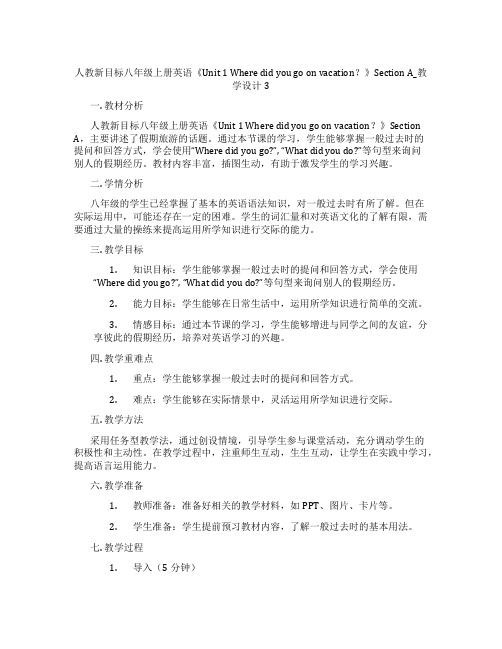
人教新目标八年级上册英语《Unit 1 Where did you go on vacation?》Section A_教学设计3一. 教材分析人教新目标八年级上册英语《Unit 1 Where did you go on vacation?》Section A,主要讲述了假期旅游的话题。
通过本节课的学习,学生能够掌握一般过去时的提问和回答方式,学会使用“Where did you go?”, “What did you do?”等句型来询问别人的假期经历。
教材内容丰富,插图生动,有助于激发学生的学习兴趣。
二. 学情分析八年级的学生已经掌握了基本的英语语法知识,对一般过去时有所了解。
但在实际运用中,可能还存在一定的困难。
学生的词汇量和对英语文化的了解有限,需要通过大量的操练来提高运用所学知识进行交际的能力。
三. 教学目标1.知识目标:学生能够掌握一般过去时的提问和回答方式,学会使用“Where did you go?”, “What did you do?”等句型来询问别人的假期经历。
2.能力目标:学生能够在日常生活中,运用所学知识进行简单的交流。
3.情感目标:通过本节课的学习,学生能够增进与同学之间的友谊,分享彼此的假期经历,培养对英语学习的兴趣。
四. 教学重难点1.重点:学生能够掌握一般过去时的提问和回答方式。
2.难点:学生能够在实际情景中,灵活运用所学知识进行交际。
五. 教学方法采用任务型教学法,通过创设情境,引导学生参与课堂活动,充分调动学生的积极性和主动性。
在教学过程中,注重师生互动,生生互动,让学生在实践中学习,提高语言运用能力。
六. 教学准备1.教师准备:准备好相关的教学材料,如PPT、图片、卡片等。
2.学生准备:学生提前预习教材内容,了解一般过去时的基本用法。
七. 教学过程1.导入(5分钟)通过展示一些假期旅游景点的图片,引导学生谈论自己的假期经历,引出本节课的主题。
2.呈现(5分钟)教师通过PPT展示本节课的主要句型:“Where did you go?”, “What did you do?”等,同时给出相应的回答,让学生感知和理解这些句型的用法。
2018年秋八年级英语上册 Unit 1 Where did you go on vacation教案 (新版)人教新目标版

Unit 1 Where did you go on vacation?课时教学设计第一课时Section A (1a-2d)1.通过看图说话、师生问答、听录音、角色扮演、猜谜语、简笔画等形式,教会本课时的单词anyone,anywhere,wonderful,few,most和短语quite a few。
2.通过师生问答、角色扮演等形式,教会“Where did you go on vacation?”“I went to…”和“Did you…?”等句型。
重点让学生学会描述自己假期所进行的活动。
难点学会用一般过去时态描述过去发生的事情;掌握不定代词的用法。
Step 1 情景导入通过师生自由交际进行复习与热身。
让学生回忆曾经学过的与假期活动相关的词汇。
例如:stay at home, go to the mountains, go to New York City, go to the beach, go to summer camp…。
通过师生谈论自己假期所做的事情,调动学生对本课时话题的学习兴趣,从而达到巩固已学知识的目的,同时实现新旧知识的衔接。
For example:T:Do you like playing basketball?S:Yes!T:So do I. Do you want to play basketball?S:OK. After class we'll play it on the playground.T:Do you usually stay at home on vacation?S:No,I don't. I usually go to the mountains.…(设计意图:本环节旨在通过“头脑风暴”进行课前热身,让学生打开记忆的大门,快速激活已有的知识库存,为下一环节的学习奠定基础。
同时,快速复习也可以激发学生的学习欲望,让学生敢于开口表达,增强学习的信心。
2018新版八年级上册英语课文翻译

2018年新版八年级上册1 - 10单元(课文+翻译)英语Go for it! Array八年级上册1 - 10单元(课文+翻译)Unit 1 Where did you go on vacation?---------------------------------- P 2你去哪儿度假了?Unit 2 How often do you exercise?-------------------------------------- P4你多久锻炼一次?Unit 3 I’m more outgoing than my sister.----------------------------- P6我比我的姐妹外向。
Unit 4 What’s the best movie theater?---------------------------------- P8最好的电影院是哪家?Unit 5 Do you want to watch a game show? --------------------------P 10你想看个游戏节目吗?Unit 6 I'm going to study computer science.------------------------- P 12我打算学习计算机科学。
Unit 7 Will people have robots?---------------------------------------- P 14人们将会有机器人吗?Unit 8 How do you make a banana milk shake? --------------------专业技术分享P16你怎样制作香蕉奶昔?Unit 9 Can you come to my party? ------------------------------------P18你能来我的聚会吗?Unit 10 If you go to the party, you’ll have a great time! -------------P20如果你去参加聚会的话,你将会玩得非常高兴!Unit 1 Where did you go on vacation? 你去哪儿度假了?Section A — 1b(P1)Conversation 1(对话1)Xiang Hua: Hey, Tina. Where did you go on vacation? 嘿,蒂娜。
人教新目标八年级上册英语《Unit 1 Where did you go on vacation?》

人教新目标八年级上册英语《Unit 1 Where did you go on vacation?》Section A_教学设计1一. 教材分析人教新目标八年级上册英语《Unit 1 Where did you go on vacation?》Section A,主要介绍了假期旅游的话题。
本节课通过引入旅游的话题,让学生学习一般过去时态的疑问句和回答。
教材内容丰富,插图生动有趣,有利于激发学生的学习兴趣。
本节课的主要语言点是一般过去时态的疑问句和回答,以及相关的旅游词汇。
二. 学情分析八年级的学生已经学习了英语一段时间,对英语有了一定的了解和掌握。
他们好奇心强,喜欢探索新事物,但同时也有可能对英语学习产生疲劳感。
因此,在教学过程中,需要充分调动学生的积极性,激发他们的学习兴趣。
学生的英语水平参差不齐,因此需要针对不同水平的学生进行分层教学。
三. 教学目标1.知识目标:学生能够掌握一般过去时态的疑问句和回答,以及相关的旅游词汇。
2.能力目标:学生能够用英语询问和描述假期旅游的经历。
3.情感目标:通过本节课的学习,学生能够培养对旅游的兴趣,增强对英语学习的热情。
四. 教学重难点1.重点:一般过去时态的疑问句和回答,以及相关的旅游词汇。
2.难点:一般过去时态的疑问句和回答的运用,以及旅游词汇的准确表达。
五. 教学方法1.任务型教学法:通过设定各种旅游相关的任务,让学生在完成任务的过程中学习和运用语言。
2.情境教学法:创设各种旅游情境,让学生在真实的情境中学习英语。
3.小组合作学习:通过小组讨论和合作,提高学生的参与度和积极性。
六. 教学准备1.教师准备:提前准备相关的旅游图片、视频和旅游经历的故事,以及旅游词汇的卡片。
2.学生准备:学生需要提前预习教材,了解本节课的学习内容。
七. 教学过程1.导入(5分钟)通过向学生展示各种旅游图片,引导学生谈论自己的旅游经历,激发学生的学习兴趣。
教师可以提问:“Where did you go on vacation?”,让学生用英语回答。
人教新目标八年级上册英语《Unit 1 Where did you go on vacation?》

人教新目标八年级上册英语《Unit 1 Where did you go on vacation?》Section B_教学设计1一. 教材分析人教新目标八年级上册英语《Unit 1 Where did you go on vacation?》Section B 主要讲述了假期旅行的主题。
通过本节课的学习,学生能够掌握一般过去时的疑问句和回答,以及如何描述过去发生的事情。
教材内容贴近学生的生活,激发学生对旅行的兴趣,提高学生的口头表达能力。
二. 学情分析八年级的学生已经掌握了基本的英语语法知识,具有一般现在时和一般过去时的基础。
在学习本节课之前,学生已经学习了如何用英语描述家庭成员和询问他们的去向。
因此,学生在学习本节课时,能够将已有的知识与新的知识相结合,提高学习效果。
三. 教学目标1.知识目标:–能够听懂、说出一般过去时的疑问句和回答。
–能够用英语描述过去发生的事情。
2.能力目标:–能够与他人用英语交流关于假期旅行的经历。
–能够提高口头表达能力。
3.情感目标:–激发学生对旅行的兴趣,拓宽视野。
–培养学生的团队协作精神。
四. 教学重难点•一般过去时的疑问句和回答。
•如何用英语描述过去发生的事情。
•一般过去时疑问句的构成和用法。
•如何在实际交流中运用一般过去时。
五. 教学方法1.情境教学法:通过设置旅行相关的情境,让学生在实际语境中学习英语。
2.交际法:鼓励学生参与课堂互动,提高学生的口头表达能力。
3.任务型教学法:通过小组合作完成任务,培养学生的团队协作精神。
六. 教学准备1.教学课件:制作与旅行相关的课件,包括图片、视频等。
2.教学道具:准备一些与旅行相关的实物道具,如地图、行李箱等。
3.小组活动准备:划分学习小组,提前分配任务。
七. 教学过程1.导入(5分钟)–教师展示一张旅行图片,引导学生谈论旅行的话题。
–学生分享自己最喜欢的旅行地点和经历。
2.呈现(10分钟)–教师通过课件呈现一般过去时的疑问句和回答。
人教新目标八年级上册英语《Unit 1 Where did you go on vacation?》

人教新目标八年级上册英语《Unit 1 Where did you go on vacation?》Section B_教学设计2一. 教材分析人教新目标八年级上册英语《Unit 1 Where did you go on vacation?》Section B 主要包括两部分内容:一是听力练习,二是口语交际。
通过本节课的学习,学生能够掌握一般过去时的疑问句和回答,学会用英语询问他人的假期经历,并能用一般过去时进行回答。
教材内容丰富,贴近学生生活,有利于激发学生的学习兴趣。
二. 学情分析八年级的学生已经掌握了部分英语语法知识,具备一定的听说读写能力。
但学生在使用一般过去时方面还存在困难,需要通过大量的练习来巩固。
此外,学生对于描述自己和他人的假期经历可能感到无从下手,需要教师在课堂上进行引导和鼓励。
三. 教学目标1.知识目标:学生能够掌握一般过去时的疑问句和回答,学会用英语询问他人的假期经历,并能用一般过去时进行回答。
2.能力目标:学生能够听懂、会说、会写本节课的重点词汇和句型。
3.情感目标:通过本节课的学习,学生能够增进与同学之间的友谊,分享彼此的假期经历。
四. 教学重难点1.重点:一般过去时的疑问句和回答,以及本节课的重点词汇和句型。
2.难点:如何运用一般过去时描述自己和他人的假期经历。
五. 教学方法1.任务型教学法:通过设置各种任务,让学生在完成任务的过程中学会运用所学知识。
2.交际法:鼓励学生进行口语交流,提高学生的交际能力。
3.情境教学法:创设各种情境,让学生在真实的环境中学会使用英语。
六. 教学准备1.教师准备:准备好课件、听力材料、相关图片等教学资源。
2.学生准备:预习本节课的内容,准备好相关的词汇和句型。
七. 教学过程1.导入(5分钟)教师通过提问学生“What did you do last weekend?”引出本节课的主题“假期经历”。
引导学生用英语表达自己的假期经历,激发学生的学习兴趣。
人教新目标八年级上册英语《Unit 1 Where did you go on vacation?》

人教新目标八年级上册英语《Unit 1 Where did you go on vacation?》Section A_教学设计2一. 教材分析人教新目标八年级上册英语《Unit 1 Where did you go on vacation?》Section A,主要讲述了假期旅游的话题。
本节课通过引入 vacation 这一主题,让学生学会询问他人假期去哪里旅游以及如何描述自己的假期经历。
教材内容丰富,插图生动,有助于激发学生的学习兴趣,提高他们的语言运用能力。
二. 学情分析八年级的学生已经掌握了基本的英语语法和词汇,具备一定的听说读写能力。
但他们在实际运用英语进行交流时,还存在着一定的困难。
因此,在教学过程中,教师需要关注学生的个体差异,创设真实、有趣的语言环境,让他们在实践中提高英语水平。
三. 教学目标1.知识目标:让学生掌握 vacation 相关词汇,学会询问他人假期去哪里旅游以及如何描述自己的假期经历。
2.能力目标:提高学生的听说读写能力,使他们能够在实际情境中运用英语进行交流。
3.情感目标:培养学生对旅游的兴趣,增强他们的生活体验。
四. 教学重难点1.重点:掌握 vacation 相关词汇,学会询问他人假期去哪里旅游以及如何描述自己的假期经历。
2.难点:运用英语进行实际交流,提高语言运用能力。
五. 教学方法1.任务型教学法:通过完成各种任务,让学生在实践中学习英语,提高他们的语言运用能力。
2.情境教学法:创设真实、有趣的语言环境,激发学生的学习兴趣。
3.交际教学法:鼓励学生积极参与课堂交流,提高他们的听说能力。
六. 教学准备1.准备相关旅游图片、视频等教学资源。
2.设计各种任务,如小组讨论、角色扮演等。
3.准备听力材料,让学生练习听力。
七. 教学过程1.导入(5分钟)利用图片、视频等教学资源,引入 vacation 这一主题,激发学生的学习兴趣。
2.呈现(5分钟)展示 vacation 相关词汇,如 beach, mountn, temple 等,并解释它们的意思。
